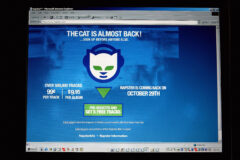Anonymous message board postings aren’t exactly a reliable barometer of public opinion, but anyone who logged on to iTunes on August 24 to buy the site’s sixth-most-popular song couldn’t help but be struck by the near unanimity of attitude toward the track in question.
“Ahhh this STINKS! Why is it in the top 10??” wrote “coleenybeany.
“THIS IS TERRIBLE!!!! PEOPLE ONLY BUY THIS CUZ THEY DESPRETLY WANT THE SONG!” offered “rickie H Lime.”

Also Read
WHY SO MANY MUSIC TECH DEALS FAIL
A poster going by the deceptively erudite moniker “PoliSciBA” chimed in with “iTunes s-u-x winkies! What a joke.”
The comment board beneath iTunes’ 17th-most-popular song was a similar cavalcade of gratuitously punctuated, caps-lock-crazy vitriol. Surprisingly, neither track was the work of Pussycat Dolls or Nickelback, or any other polarizing figure likely to incur copious dollops of online scorn simply for existing. In fact, nobody knew a thing about the bands that played on these tunes — not even the musicians’ real names. That, it seems, was the problem. As “Melissa87” put it: “Ick! who r the hit masers anyway?”
The “hit masers” were in fact Hit Masters, a group of studio musicians who’d recorded a soundalike cover of Kid Rock’s “All Summer Long” and released it on iTunes on August 12. By the 24th, due almost entirely to the fact that Kid Rock refuses to allow his own recordings to be sold by the digital retail giant, Hit Masters had moved more than 100,000 downloads of their version, which was perched at No. 6 on the iTunes chart. Kid Rock probably wasn’t bothered. As he put it to industry pundit Bob Lefsetz in a typo-pocked e-mail that suggested very little cultural distance between himself and the average iTunes commenter: “THIERS plenty of ways to have big sales without itunes….I just proved it.” By September, “All Summer Long” had propelled sales of his 2007 album, Rock N Roll Jesus, to two million units.
Rock’s label, Atlantic, tried to repeat this feat with another artist, Estelle, whose slinky, Kanye West–assisted R&B shuffle “American Boy” had been a breakout hit for the British singer. The tune had been selling briskly on iTunes until August 20, when the label suddenly removed it in an attempt to jolt the previously unimpressive performance of Estelle’s album, Shine. It didn’t work — Shine‘s sales actually dipped — but fans kept buying “American Boy,” albeit a version recorded by a group dubbed Studio All-Stars. Four days later, their take, which features an impressive Estelle impersonator and an atrocious Kanye one, had worked its way to No. 17 on the list of iTunes top-sellers.
“It’s a major surprise that it’s on the charts,” says Michael Infante, chief executive for One Media Publishing, the company behind the “American Boy” cover, which had been available since mid-July but had sold only 17 copies before Estelle’s original was pulled from iTunes. “These things are not put up to fill a void. We don’t do an analysis of the market and then fill the gaps. I mean, I wasn’t even aware the original wasn’t available. This is more of a fluke.”
Soundalike recordings — often called “tribute songs” or “specialty music” within the industry — have been around for decades. Labels like Bell, Embassy, and Hit churned out quickie imitations in the 1950s, but the form reached its commercial apex in the ’70s, when Ronco and K-Tel advertised anonymous cover versions of popular hits on late-night TV commercials, and another label, Pickwick, scored a No. 1 hit in the U.K. with one of its Top of the Pops compilations. These recordings succeeded by offering — at a discount — collections of songs that, due to prohibitive costs, licensing constraints, administrative hassles, and contractual obligations, major labels couldn’t put together themselves.
In the United States, copyright law makes recording and selling any cover song pretty simple. If you want to pimp your own version of “All Summer Long” — itself already a pastiche of “Werewolves of London” and “Sweet Home Alabama” — you don’t need permission from Kid Rock, his publishing company, his record label, or anyone else, for that matter. You just have to notify the song’s writers and publishers and make sure you pay them royalties on each sale of your recording.
But the rise of digital retailers like iTunes, Amazon, and eMusic has changed the landscape in the last few years. Where previously, soundalike recordings struggled to find shelf space in music stores, now they’re as easily accessible as most any other recording. Furthermore, when buying music can be accomplished with a mouse click and most tracks cost less than a dollar, customers are more likely to take a flyer on a curiosity or — as some critics of soundalikes would contend — be fooled into buying something they never wanted. None of this can be particularly pleasing to labels already facing a rather dire business environment.
“Tributes are not liked by some majors,” says Infante. “But let’s remember one thing: Publishers, writers, and composers all collect their royalties here. So when the label bleats on behalf of the artist, it’s not always the whole story.”
Read more about soundalikes in the Nov. 2008 issue of SPIN, on newsstands now.




